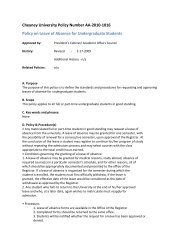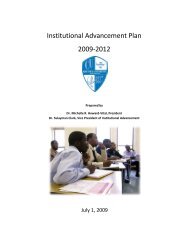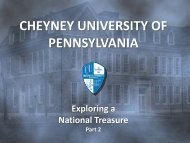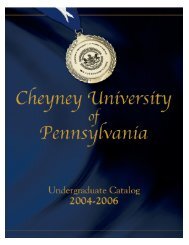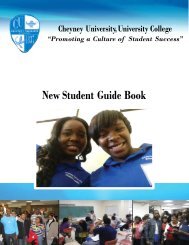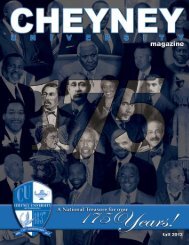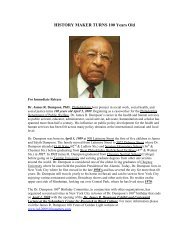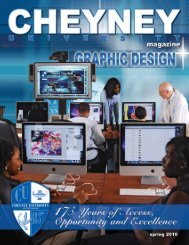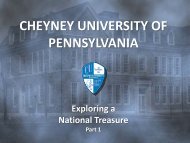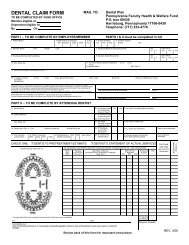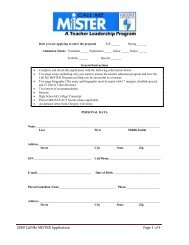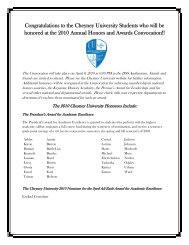campus security and fire safety report - Cheyney University of ...
campus security and fire safety report - Cheyney University of ...
campus security and fire safety report - Cheyney University of ...
- No tags were found...
You also want an ePaper? Increase the reach of your titles
YUMPU automatically turns print PDFs into web optimized ePapers that Google loves.
The <strong>Cheyney</strong> Police Department advocates <strong>and</strong> promotes safe study <strong>and</strong> work conditions within the<strong>University</strong> by addressing the local, state <strong>and</strong> federal regulations. Departmental <strong>of</strong>ficers'responsibilities are to inform <strong>and</strong> help implement the <strong>safety</strong> policies at the departmental level.Each individual is responsible for conducting activities in a manner that will not endangerhim/herself or others. Any difficulty in performing procedures safely is to be <strong>report</strong>ed to theimmediate supervisor. Individuals are also expected to take an active part in correcting <strong>and</strong><strong>report</strong>ing hazards.Each individual should become familiar with the location <strong>of</strong> exits, <strong>fire</strong> alarm <strong>and</strong> <strong>fire</strong> suppressionsystems in the area. If trained, become familiar with the location <strong>and</strong> type <strong>of</strong> <strong>fire</strong> extinguishers in thearea.Due to the transitory nature <strong>of</strong> the university population, Facilities Operations <strong>and</strong> <strong>Cheyney</strong> Policepersonnel are trained in the use <strong>of</strong> <strong>fire</strong> extinguishers <strong>and</strong> will be instrumental in assisting withemergency evacuations.However, <strong>fire</strong> alarms alone do not ensure any person's <strong>safety</strong> unless that person knows how tosafely exit a building when the <strong>fire</strong> alarm sounds.Fire Drills are conducted frequently in all residence halls. These drills are run by <strong>Cheyney</strong> Police <strong>and</strong>Residence Life. The first drill is scheduled early in the fall semester <strong>and</strong> all residents are told inadvance. Additional drills are conducted during the fall semester with no advance warning. Fire drillswill be conducted during the spring semester.If residents do not evacuate a hall in a reasonable amount <strong>of</strong> time, the drill is repeated until <strong>of</strong>ficialsare satisfied with the evacuation time. All repeat drills are unannounced.When the <strong>fire</strong> alarm sounds, you should leave the building immediately--even if someone else tellsyou it is a false alarm. Do not use the elevator <strong>and</strong> do not assume it is an alarm test (unless a testhas been announced)--<strong>fire</strong> alarms should never be taken lightly.You may go back into the building when personnel from the Concordville Fire Dept. or <strong>Cheyney</strong>Police Department tells you it is safe to re-enter.POTENTIAL FIRE HAZARDS: IDENTIFICATION AND CONTROLFires, like all other types <strong>of</strong> accidents, are largely preventable.Fire hazards at a university can range from popcorn in a microwave oven to flammable liquids stored in alaboratory. Usually most <strong>fire</strong>s are small <strong>and</strong> are quickly extinguished. Fires on college <strong>campus</strong>es areespecially difficult because <strong>of</strong> the population density. Students are concentrated in classrooms, places <strong>of</strong>assembly, <strong>and</strong> dormitories. When a <strong>fire</strong> starts, it can affect a large population at one time. Another problemcomplicating the <strong>fire</strong> problem on <strong>campus</strong>es is the nature <strong>of</strong> the buildings. Buildings housing classrooms <strong>and</strong>residences can be old, unprotected with open stairwells, <strong>and</strong> have limited <strong>fire</strong> equipment.The following procedures are designed to reduce the potential for <strong>fire</strong>s in academic <strong>and</strong> residential buildingsby controlling combustible materials, reducing ignition sources, <strong>and</strong> ensuring that means <strong>of</strong> egress areproperly maintained.Residence Hall Fire Safety RulesThe following are prohibited in or around the residence halls: a) the use or possession <strong>of</strong> weapons,pyrotechnics, or other materials including flammable substances which may endanger resident's health <strong>and</strong><strong>safety</strong>; b) use or possession <strong>of</strong> items which pose a <strong>fire</strong> hazard such as hot pots, hot plates, <strong>and</strong> sun lamps, as19



